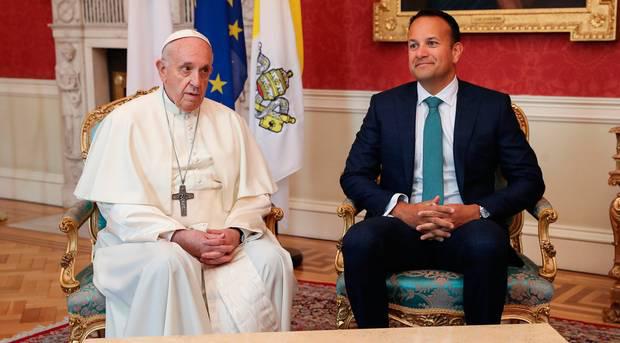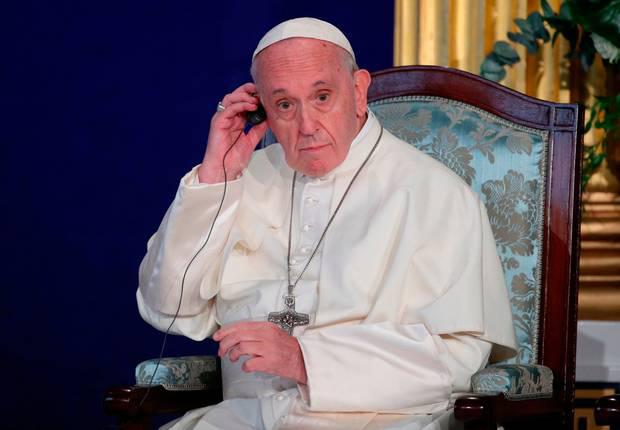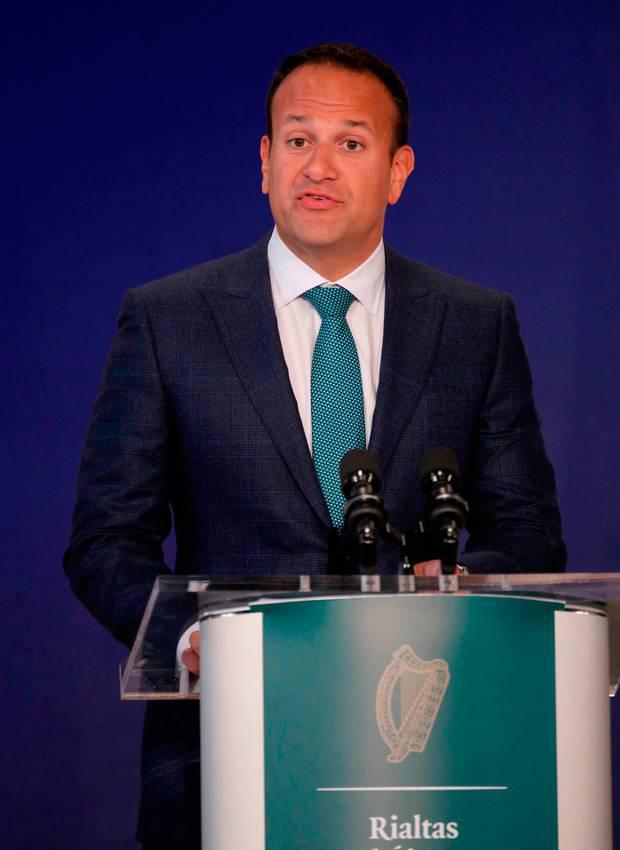|
Pope Francis speech: Calls clerical abuse scandal in Ireland 'repugnant', makes thinly-veiled reference to abortion referendum
By Kevin Doyle
[with video]
MEASURES must be taken in response to the “betrayal of trust” and "repugnant" abuse inflicted on abuse victims in Ireland, Pope Francis has said. In his first public statement since arriving in Dublin, the Pontiff said the Catholic Church must work to “remedy past mistakes and to adopt stringent norms meant to ensure that they do not happen again”. Speaking in front of Taoiseach Leo Varadkar in Dublin Castle, Pope Francis also risked raising the temperature around his visit with a thinly-veiled reference to the abortion referendum. He questioned whether a “materialistic ‘throwaway culture’” has made people “increasingly indifferent to the poor and to the most defenceless members of our human family, including the unborn, deprived of the very right to life”. However, the Taoiseach told the audience that Ireland has "voted in our parliament and by referendum to modernise our laws - understanding that marriages do not always work, that women should make their own decisions, and that families come in many forms including those headed by a grandparent, lone parent or same-sex parents or parents who are divorced". He added: "Holy Father, I believe that the time has now come for us to build a new relationship between church and state in Ireland - a new covenant for the 21st Century. "It is my hope that your visit marks the opening of a new chapter in the relationship between Ireland and the Catholic Church." Pope Francis went on to praise those who worked to bring about the Good Friday Agreement and 20 years of peace in Northern Ireland. However, most attention was a section of his contribution – made in Italian – where he acknowledged how the Church had failed the “most vulnerable”. “I cannot fail to acknowledge the grave scandal caused in Ireland by the abuse of young people by members of the Church charged with responsibility for their protection and education,” he said. “The failure of ecclesiastical authorities – bishops, religious superiors, priests and others – to adequately address these repugnant crimes has rightly given rise to outrage, and remains a source of pain and shame for the Catholic community. I myself share those sentiments.” The Pope praised his predecessor, Benedict XVI, who he said “spared no words in recognising both the gravity of the situation” and made “frank and decisive intervention”. Pope Francis said the Church in Ireland “past and present” has played a role in promoting the welfare of children. “It is my hope that the gravity of the abuse scandals, which have cast light on the failings of many, will serve to emphasise the importance of the protection of minors and vulnerable adults on the part of society as a whole. “In this regard, all of us area aware of how urgent it is to provide our young people with wise guidance and sound values on their journey to maturity,” he said. Mr Varadkar said the Church was meant to be a place of charity, forgiveness and compassion - but "far too often there was judgement, severity and cruelty, in particular, towards women and children and those on the margins". He cited Magdalene Laundries, Mother and Baby Homes, industrial schools, illegal adoptions and clerical child abuse as "stains on our State, our society and also the Catholic Church". "Wounds are still open and there is much to be done to bring about justice and truth and healing for victims and survivors," Mr Varadkar said. He asked the Pope to use his office and influence to ensure there is "zero tolerance for those who abuse innocent children or who facilitate that abuse". The speech was made in front of guests, including members of the LGBTI community, who were invited by the Government. Other attendees included ministers, politicians from the main parties, , MEPs, members of the judiciary, the Civil Service, and the Diplomatic Corps from over 50 countries. Representatives from Northern Ireland in attendance include members of Sinn Fein, Alliance Party, the SDLP and the Ulster Unionist Party, along with the Lord Mayor of Belfast and school children from Derry. The UK Secretary of State for Northern Ireland is also in attendance. Pope Francis made specific reference to the situation in the North, describing the Troubles as a “long conflict that separated brothers and sisters of a single family”. Praising the Good Friday Agreement, he said all sides had worked together to create “a dynamic context for the peaceful settlement of a conflict that had caused untold pain on both sides”. “We can give thanks for two decades of peace that followed his historic agreement, while expressing firm hope that the peace process will overcome every remaining obstacle and help give birth to a future of harmony, reconciliation and mutual trust.” In closing, the Pope noted that 90 years ago the Holy See was among the first international institutions to recognise the Irish Free State. “The threads of that history reach back over a millennium and half ago, when the Christian message, preached by Palladius and Patrick, found a home in Ireland and became an integral part of Irish life and culture. “Many 'saints and scholars' were inspired to leave these shores and bring their newfound faith to other lands," he said. In his speech Mr Varadkar expressed a hope that "during a future visit", the Pope would visit Northern Ireland. He praised the Catholic Church for providing "education to our children when the State did not, in the open air next to hedgerows and in the schools and educational institutions they built". "They founded our oldest hospitals, staffed them, and provided welfare for so many of our people. "We think of the many wonderful organizations today who continue that work, like St. Vincent de Paul to name just one." And Mr Varadkar said that "even today, as we struggle with a housing shortage and homelessness, Catholic organisations and people inspired by their Catholic faith fill a gap in providing services, for example, through organisations like CrossCare". Contact: kdoyle@independent.ie
|
.
Any original material on these pages is copyright © BishopAccountability.org 2004. Reproduce freely with attribution.


